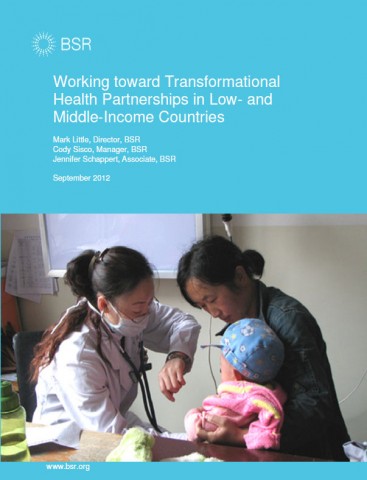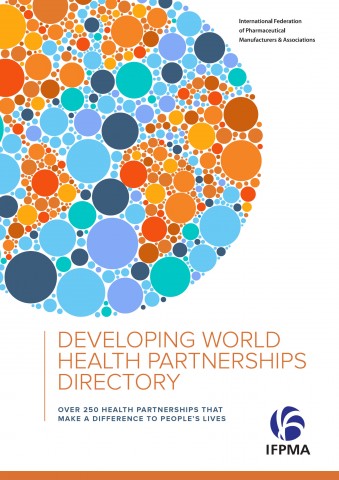
- Directory highlights commitment of the research-based pharmaceutical industry and partners to improve health in the developing world through 220 partnerships operating in more than 160 countries
- Launch coincides with the release of new BSR review evaluating these partnerships and providing recommendations for the future
The International Federation of Pharmaceutical Manufacturers & Associations (IFPMA) published the 2012 update to its Developing World Health Partnerships Directory today. Now totaling 220 and reaching people in more than 160 countries, these health partnerships highlight the commitment of research-based pharmaceutical industry and its many partners including governments, intergovernmental organizations, nongovernmental organizations, private sector companies and universities to improve health around the world.
The launch of this directory coincides with the release of an independent review of the contributions these health partnerships’ make to the health of people in low- and middle-income countries. This review was conducted by BSR , a global business network and consultancy focused on sustainability.
“Global health issues are complex, and solutions often require a range of organizations working together,” said Eduardo Pisani, IFPMA Director General. “Understanding the value of partnerships, our industry and partners have increased these programs dramatically in recent years as highlighted in our directory. This year, we are pleased that BSR analyzed these programs and made suggestions for increasing the benefit people in developing countries.”
The industry-led health partnerships catalogued in the IFPMA’s Developing World Health Partnerships Directory focus on a wide range of activities from developing new treatments and improving their availability to strengthening health systems, raising awareness, prevention and training. They also cover various types of diseases such as HIV/AIDS, neglected tropical diseases, malaria, non-communicable diseases and more cross-cutting challenges such as women and children’s health. (Please see the breakdown of activities below).
According to BSR’s review, ninety percent (90%) of companies surveyed expect to increase partnership commitments towards non-communicable diseases while maintaining commitments across other therapeutic areas. While sixty-five percent (65%) of the industry-led health partnerships currently operate in Sub-Saharan Africa, expansion is planned in South Asia, East Asia and Latin America. Forty percent (40%) of companies interviewed expect to increase investments in partnerships.
The BSR review also lists the critical success factors for increasing the impact of the health partnerships including the adoption of a health needs-based approach, engaging in broad-based and multi-company partnerships, aligning existing and future partnerships to maximize shared resources and expertise. Existing country systems and local ownership should also be better utilized. Finally, comprehensive outcome tracking and impact measures are always vital.
To carry out the review, “BSR developed an evaluation framework that will help the IFPMA, its stakeholders, and companies more clearly understand how individual partnerships are contributing to global health goals,” said Mark Little, BSR’s Health Care Director. “By using the four criteria the UN Global Compact has identified as critical to transformational partnerships, our analysis has highlighted where industry-led health partnerships have been most successful, where gaps remain, and what are the critical success factors for the realization of global health goals.”
Geneva, 11 September 2012










